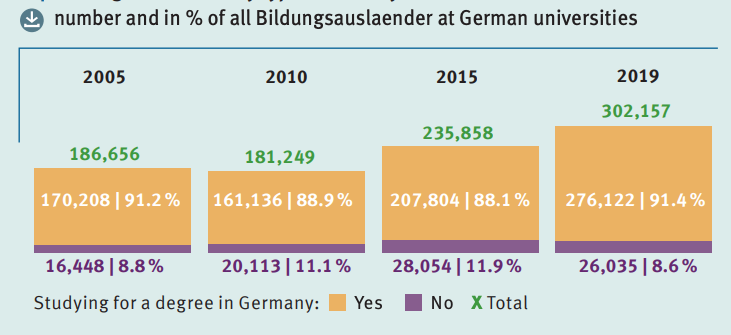While an increasing number of students who would have been heading to the UK and the US this autumn say they are considering changing their study plans, many are turning to destinations such as Germany that have responded better to the coronavirus pandemic.
News and business analysis for Professionals in International Education
Have some pie!
Interest in studying in Germany grows as Covid-19 response praised
 Germany has been praised for its response to coronavirus. Photo: Mariola Kucharska/Pixabay
Germany has been praised for its response to coronavirus. Photo: Mariola Kucharska/Pixabay “Germany’s popularity among international students is growing based on the first results in dealing with Covid-19. Germany has one of the best health care systems in the world,” said Akos Kiraly, director of marketing and recruitment at Lancaster University Leipzig.
“More demand does not mean more enrolment in this situation. There are still a lot of mobility obstacles in place”
“I anticipate that Germany’s international student numbers will grow even stronger in the near future, especially from the EU, as many students will need to look for alternative options within the EU with English-taught programs.”
The world’s two top study destinations – the US and the UK – haven’t exactly been praised for their handling of the coronavirus outbreak. Borders remain closed in the US, while the UK remains on lockdown with no end in sight.
Whether students choose to study in Germany over other destinations, however, may have more to do with these destinations and their ongoing response to coronavirus.
Despite free tuition, top institutions and English-taught programs, Germany attracts fewer international students than its more expensive counterparts.
“Public health is not the only relevant factor. For example, I do believe Italy’s popularity will actually grow,” said Study.EU founder Gerrit Bruno Blöss.
“Our statistics already indicate student interest at previous levels. The country was hit hard, but Italians showed remarkable morale, and thanks to social media everyone worldwide took notice.”
Additionally, Edwin Van Rest, CEO of Studyportals, said Germany “stands to benefit”, but is cautious about the overall impact.
“More demand does not mean more enrolment in this situation. There are still a lot of mobility obstacles in place,” he added.
Meanwhile, new data from DAAD and DZHW shows that the number of international students in Germany continued to rise in 2019, reaching 394,665 international students overall.
In 2015, 207,804 Bildungsausländer (foreign students who did their high school qualifications outside Germany) were studying for a degree at German universities. By 2019, this number had risen to 276,122.
Germany has a more diverse range of sources of international students than other top destinations. Although China still makes up 13.2% of the international student body, with 39,871 Chinese citizens studying in Germany last year, the top 10 source countries account for only 45% of all international students.
This is compared to the US where 71.6% of international students come from the 10 largest source countries, and 65% in the UK.
After India in second position, the third most common source country for international students in Germany is Syria (4.3%).
Around three out of four international students in Germany are studying at bachelor’s or master’s level. Berlin, Saxony and Thuringia have the most international students, with the latter two having overtaken Saarland and Brandenburg since 2014.
Interestingly, it’s not just in-person classes though that are getting more attention right now.
“We are also seeing a higher number of international students enrolling in online programs at German universities”
“We are also seeing a higher number of international students enrolling in online programs at German universities,” said Gent Ukehajdaraj of Studying in Germany.
“It also means international students can get a German degree without having to apply for a visa or spend significantly more money to come to Germany, while at the same time having access to all the benefits that a German degree offers such as the post-study work visa. We think distance learning will be a ‘new normal’ after the pandemic ends.”
Still looking? Find by category:



